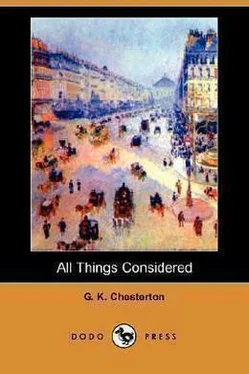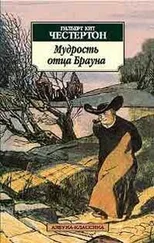Quite equally subtle and spiritual is the idea at the back of laughing at foreigners. It concerns the almost torturing truth of a thing being like oneself and yet not like oneself. Nobody laughs at what is entirely foreign; nobody laughs at a palm tree. But it is funny to see the familiar image of God disguised behind the black beard of a Frenchman or the black face of a Negro. There is nothing funny in the sounds that are wholly inhuman, the howling of wild beasts or of the wind. But if a man begins to talk like oneself, but all the syllables come out different, then if one is a man one feels inclined to laugh, though if one is a gentleman one resists the inclination.
Mr. Max Beerbohm, I remember, professed to understand the first two forms of popular wit, but said that the third quite stumped him. He could not see why there should be anything funny about bad cheese. I can tell him at once. He has missed the idea because it is subtle and philosophical, and he was looking for something ignorant and foolish. Bad cheese is funny because it is (like the foreigner or the man fallen on the pavement) the type of the transition or transgression across a great mystical boundary. Bad cheese symbolises the change from the inorganic to the organic. Bad cheese symbolises the startling prodigy of matter taking on vitality. It symbolises the origin of life itself. And it is only about such solemn matters as the origin of life that the democracy condescends to joke. Thus, for instance, the democracy jokes about marriage, because marriage is a part of mankind. But the democracy would never deign to joke about Free Love, because Free Love is a piece of priggishness.
As a matter of fact, it will be generally found that the popular joke is not true to the letter, but is true to the spirit. The vulgar joke is generally in the oddest way the truth and yet not the fact. For instance, it is not in the least true that mothers–in–law are as a class oppressive and intolerable; most of them are both devoted and useful. All the mothers–in–law I have ever had were admirable. Yet the legend of the comic papers is profoundly true. It draws attention to the fact that it is much harder to be a nice mother–in–law than to be nice in any other conceivable relation of life. The caricatures have drawn the worst mother–in–law a monster, by way of expressing the fact that the best mother–in–law is a problem. The same is true of the perpetual jokes in comic papers about shrewish wives and henpecked husbands. It is all a frantic exaggeration, but it is an exaggeration of a truth; whereas all the modern mouthings about oppressed women are the exaggerations of a falsehood. If you read even the best of the intellectuals of to–day you will find them saying that in the mass of the democracy the woman is the chattel of her lord, like his bath or his bed. But if you read the comic literature of the democracy you will find that the lord hides under the bed to escape from the wrath of his chattel. This is not the fact, but it is much nearer the truth. Every man who is married knows quite well, not only that he does not regard his wife as a chattel, but that no man can conceivably ever have done so. The joke stands for an ultimate truth, and that is a subtle truth. It is one not very easy to state correctly. It can, perhaps, be most correctly stated by saying that, even if the man is the head of the house, he knows he is the figurehead.
But the vulgar comic papers are so subtle and true that they are even prophetic. If you really want to know what is going to happen to the future of our democracy, do not read the modern sociological prophecies, do not read even Mr. Wells's Utopias for this purpose, though you should certainly read them if you are fond of good honesty and good English. If you want to know what will happen, study the pages of Snaps or Patchy Bits as if they were the dark tablets graven with the oracles of the gods. For, mean and gross as they are, in all seriousness, they contain what is entirely absent from all Utopias and all the sociological conjectures of our time: they contain some hint of the actual habits and manifest desires of the English people. If we are really to find out what the democracy will ultimately do with itself, we shall surely find it, not in the literature which studies the people, but in the literature which the people studies.
I can give two chance cases in which the common or Cockney joke was a much better prophecy than the careful observations of the most cultured observer. When England was agitated, previous to the last General Election, about the existence of Chinese labour, there was a distinct difference between the tone of the politicians and the tone of the populace. The politicians who disapproved of Chinese labour were most careful to explain that they did not in any sense disapprove of Chinese. According to them, it was a pure question of legal propriety, of whether certain clauses in the contract of indenture were not inconsistent with our constitutional traditions: according to them, the case would have been the same if the people had been Kaffirs or Englishmen. It all sounded wonderfully enlightened and lucid; and in comparison the popular joke looked, of course, very poor. For the popular joke against the Chinese labourers was simply that they were Chinese; it was an objection to an alien type; the popular papers were full of gibes about pigtails and yellow faces. It seemed that the Liberal politicians were raising an intellectual objection to a doubtful document of State; while it seemed that the Radical populace were merely roaring with idiotic laughter at the sight of a Chinaman's clothes. But the popular instinct was justified, for the vices revealed were Chinese vices.
But there is another case more pleasant and more up to date. The popular papers always persisted in representing the New Woman or the Suffragette as an ugly woman, fat, in spectacles, with bulging clothes, and generally falling off a bicycle. As a matter of plain external fact, there was not a word of truth in this. The leaders of the movement of female emancipation are not at all ugly; most of them are extraordinarily good–looking. Nor are they at all indifferent to art or decorative costume; many of them are alarmingly attached to these things. Yet the popular instinct was right. For the popular instinct was that in this movement, rightly or wrongly, there was an element of indifference to female dignity, of a quite new willingness of women to be grotesque. These women did truly despise the pontifical quality of woman. And in our streets and around our Parliament we have seen the stately woman of art and culture turn into the comic woman of Comic Bits . And whether we think the exhibition justifiable or not, the prophecy of the comic papers is justified: the healthy and vulgar masses were conscious of a hidden enemy to their traditions who has now come out into the daylight, that the scriptures might be fulfilled. For the two things that a healthy person hates most between heaven and hell are a woman who is not dignified and a man who is.
There has appeared in our time a particular class of books and articles which I sincerely and solemnly think may be called the silliest ever known among men. They are much more wild than the wildest romances of chivalry and much more dull than the dullest religious tract. Moreover, the romances of chivalry were at least about chivalry; the religious tracts are about religion. But these things are about nothing; they are about what is called Success. On every bookstall, in every magazine, you may find works telling people how to succeed. They are books showing men how to succeed in everything; they are written by men who cannot even succeed in writing books. To begin with, of course, there is no such thing as Success. Or, if you like to put it so, there is nothing that is not successful. That a thing is successful merely means that it is; a millionaire is successful in being a millionaire and a donkey in being a donkey. Any live man has succeeded in living; any dead man may have succeeded in committing suicide. But, passing over the bad logic and bad philosophy in the phrase, we may take it, as these writers do, in the ordinary sense of success in obtaining money or worldly position. These writers profess to tell the ordinary man how he may succeed in his trade or speculation—how, if he is a builder, he may succeed as a builder; how, if he is a stockbroker, he may succeed as a stockbroker. They profess to show him how, if he is a grocer, he may become a sporting yachtsman; how, if he is a tenth–rate journalist, he may become a peer; and how, if he is a German Jew, he may become an Anglo–Saxon. This is a definite and business–like proposal, and I really think that the people who buy these books (if any people do buy them) have a moral, if not a legal, right to ask for their money back. Nobody would dare to publish a book about electricity which literally told one nothing about electricity; no one would dare to publish an article on botany which showed that the writer did not know which end of a plant grew in the earth. Yet our modern world is full of books about Success and successful people which literally contain no kind of idea, and scarcely any kind of verbal sense.
Читать дальше








